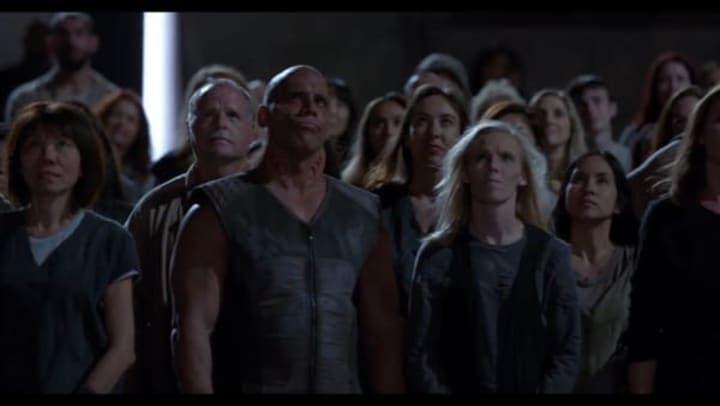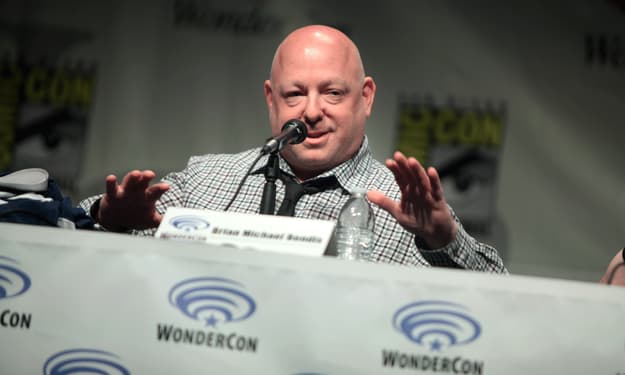
Marvel's Inhumans has finally launched on the small screen, and it's time to take a critical look at what the show stands for. At heart, every superhero represents a core concept or ideal. That's why Superman is often associated with the words, "Truth, justice, and the American Way." It's why Fox's The Gifted TV series taps into the core X-Men concept of the battle against prejudice. And it's why Spider-Man will never enjoy a happy life, because he must always return to that defining idea of "power and responsibility."
So what is Inhumans all about? On the face of it, the series revolves around a Royal Family, so you'd think that family would the defining concept of the show. But it most certainly isn't. Instead, the defining concept is Royalty, and it's all about what makes this family Royal in a caste system. That's where we hit a real problem.
The Caste-Based Society of Attilan and the Shadow of Eugenics
The City of Attilan is a caste-based society, and your position in that hierarchy is determined by your genes. We're told that this society is one that the Inhumans believe has been forced upon them, a result of living in an enclosed area with limited resources. That detail suggests that different castes probably have different rights to reproduce, although the series doesn't necessarily realize that it implies such a thing.
Sitting the top of the system are the Inhuman Royal Family, who seem to hold the position by virtue of inheritance. The next caste appear to be your general Inhumans, and it's notable that we never see them doing anything that remotely looks like work. Interestingly, it appears that anyone from the Inhuman caste can marry into the Royal Family. That's how Medusa and, by extension, Crystal have become part of it (even though their parents were part of a previous attempt to overthrow it!).
The lowest caste are Humans, those who have not inherited the Inhuman gene. Agents of S.H.I.E.L.D. Season 4 had already hinted that not everybody in the same bloodline would inherit the key gene, as Senator Ellen Nadeer was unaffected by Terrigen, even though her brother became an Inhuman. On Attilan, those who do not inherit the Inhuman gene live their lives in the mines, in conditions of poverty and need. They're the laborer caste, and are treated with disinterest by the rest of Inhuman society. In a society with advanced technology, they work with pickaxes and even their bare hands.
All of this is supervised by a mysterious, quasi-religious Genetic Council, who are sure to play a role going forward. They ensure Terrigenesis is viewed as a sacred ritual, insisting that it "allows the true nature of the individual to be revealed." The whole process is described as "flawless genetics."
This caste-based society is a deeply problematic concept, and in the real world, it's linked to a discredited science known as eugenics. The goal of eugenics was to apply principles of genetics and hereditary evolution to society as a whole, using them to shape social structure. It was launched in the late 1800s, when scholar Francis Galton (a half-cousin of Charles Darwin) claimed that the positive characteristics of the English upper class, such as intelligence, were hereditary. He theorized:
"Consequently, as it is easy, ….. to obtain by careful selection a permanent breed of dogs or horses gifted with peculiar powers of running, or of doing anything else, so it would be quite practicable to produce a highly-gifted race of men by judicious marriages during several consecutive generations."
In the 1900s, eugenics become increasingly popular in the United States. Several U.S. States established sterilization laws, resulting in the forced sterilization of 64,000 people (these laws were supported by the Supreme Court). Popular movies lauded the science; Based on a true story, The Black Stork focused on a "heroic" doctor who persuaded parents to allow a syphilitic infant to die. Meanwhile, in Germany, eugenics was effortlessly absorbed into Adolf Hitler's ideology, and became a cornerstone of Nazism.
Stan Lee, Marvel's greatest creator, grew up in this time-period. Perhaps unconsciously, he drew upon these concepts when he created the Inhumans years later in the 1960s, fashioning an entire race whose core concept was eugenics. A person's position in Inhuman society was shaped only by an accident of genetics. What's more, Lee also introduced a race known as the Alpha Primitives, a race of sub-humans who had been bred as slaves, and whose lack of mental faculty meant they were fit only to serve as slaves. The TV series has abandoned this idea (which was actually referenced in Agents of S.H.I.E.L.D. Season 3), and has substituted the Alpha Primitives with non-powered Humans.
Stan Lee was, and is, a creative genius. But he was also a man of his time, and he was always strongly influenced by the trends of popular culture. Looking back at his work now, there are certain social elements included which we would now reject — and so would he.
The Problem With Marvel's 'Inhumans'

This is the fundamental problem with Marvel's Inhumans. The first episodes map put out a basic premise where we're clearly expected to side with the Royal Family rather than with Maximus, who seeks to break this eugenics-inspired caste system wide open. We're supposed to hope that the status quo will be restored, that Black Bolt will reclaim his throne, and that the Royal Family will regain their positions of authority. In moral terms, it's deeply problematic.
Interestingly enough, it looks as though some key figures in Marvel are aware of this issue. Roel Reiné — the director who helmed the first two episodes — told our own David Opie:
"Black Bolt and Medusa are on the wrong side and Maximus is on the right side of reason. The only thing is his means to get there are a little bit more radical and extreme. In the end, his path is a righteous path, which makes his character very interesting."
Unfortunately, the first two episodes provide no hint of this self-awareness. Reiné invites us to see the series as a complex one, where neither side of the Inhuman civil war are truly in the right. In contrast, the opening episodes clearly intend to encourage audiences to root for the Royal Family. It's hard to see good in Maximus, particularly when he's just brutally shaved Medusa's head in a scene that's viscerally reminiscent of rape.
How can the series resolve this? There's only one way, but it's a risky one. Somehow, over the course of the next six episodes, Inhumans needs to confront the Royal Family with the reality that their eugenics-inspired caste system is wrong. They need to be forced into a situation where they allow it to change, where their justification of the status quo falls flat.That means Inhumans can only succeed if this series dares to first establish, and then to destroy, its own core concept. Most television shows (and comics) work precisely because they accept and successfully channel their core idea. In contrast, Inhumans can only become worth watching if it has the courage to press the self-destruct button.
The problem facing Inhumans is a simple one; its core concept represents an outdated, discredited ideology that has largely been forgotten in the mists of time. There's a reason the Inhuman Royal Family have always been a hard-sell, even in the comics. If Marvel Television is going to make this work, they're going to need to make some bold decisions. The problem though is once you've destroyed a narrative's core idea, what do you substitute it with? Showrunner Scott Buck claims to be looking forward to possible future seasons, and there's only one way that can happen; if the show radically changes its identity going forward.
About the Creator
Tom Bacon
A prolific writer and film fan, Tom has a deep love of the superhero genre.






Comments
There are no comments for this story
Be the first to respond and start the conversation.